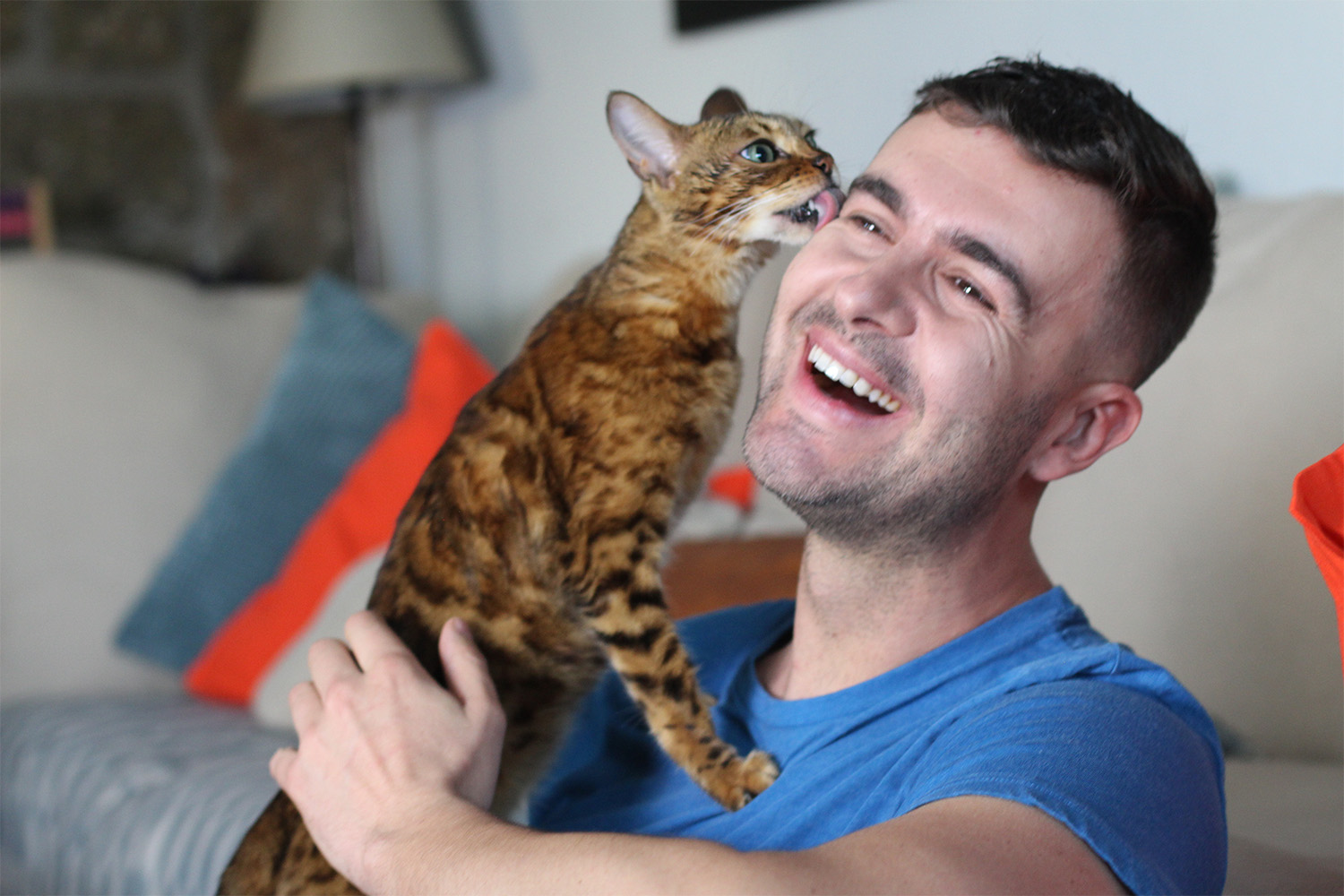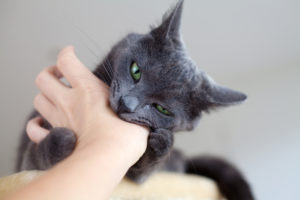When we think of how a cat shows us love, it’s not always in the form of licking like how dogs do. A cat’s tongue is much rougher than a dog’s and can even be painful sometimes.
This is because of the papillae — tiny and firm backward-facing spines that sit on your cat’s tongue and can feel like sandpaper. Due to this feeling, it’s not always very welcoming to have your cat lick you, but the behavior itself isn’t always meant to be negative.
If you want to learn more about why your furry friend might be licking you, keep reading.
Is My Cat Licking Me Normal?
Licking is very normal behavior for cats, and there are plenty of possible reasons for this feline behavior. It’s the easiest way for them to clean themselves, and they spend a lot of their time doing it.
When it comes to licking you, their human parents, it is also seen as relatively standard behavior. However, there isn’t much science around to back up the exact reasons why it happens.
When your cat licks you, it can be uncomfortable, but your cat likely doesn’t realize that it can hurt because it is such a normal grooming behavior to them.
Why Does This Happen?
There are a few theories as to why your cat might lick you that range from affection to signs of stress. We must pay attention to our cat’s behaviors as being abnormal in order to keep an eye out for their overall well-being.
If you recognize a change in your cat’s behavior on top of excessive licking, there might be an issue that needs to be addressed. Reaching out to your cat’s veterinarian is the easiest way to solve any issues.
Otherwise, there are several reasons that could be causing your cat to lick you. Here are some:
Seeking Attention
One of the most common reasons that your feline friend is licking you might be because they want your attention. Because this behavior isn’t always pleasurable for you, you are likely to pay quick attention to your cat when they do it. This might have taught them that licking can bring them attention almost immediately, which is great news for them!
They might want pets, food, to play with a cat toy, or simply for your eyes to be on them, and by licking you, they can capture your attention easily.
Showing Affection
From a young age, cats are licked by their mothers as a way to clean them and as a sign of affection. This means that if your cat is now licking you, it could be an extension of that love and affection. They are doing to their cat parents what was once done to them by their furry family members.
Licking might be paired with purring and kneading, two other ways cats might try to show you affection. Purrs, kneading, and cuddling are usually good indicators of the reasoning behind your cat’s licking fascination because it shows that they are expressing their love to you with their body language.
Marking Behavior
If your cat enjoys licking you, they might be doing it as a way to mark you as their territory. This lets other animals and cats around you know that you have a cat at home who loves you the most. However, it can become a problem if you have other animals in the house and your cat becomes possessive of you.
By licking you, it helps them to identify you. As kittens, their mother would lick them all to create a certain smell that would help identify them as a unit. This same method can be passed on when you have a cat who wants to identify you as a part of their family.
Creating a Bond
Licking is thought by animal behaviorists to help form a social bond between you and your cat. It lets you know that you are part of their trusted circle.
A mother cat will lick her baby to help form a bond between them, so when your cat begins doing this to you, they are establishing that bond with you.
Expressing Stress or Anxiety
Another reason behind licking behaviors from cats could be stress and anxiety. It’s not always that licking is a cute and sweet behavior; instead, it could result from feeling highly stressed out. This can sometimes be a displacement behavior that helps to soothe your cat and alleviate stress.
A way for you to determine if it’s stress is to recognize if there are any triggers around when it occurs. Loud noises, bright lights, new people, and strange objects might cause stress for your cat, which could lead to excessive licking.
You don’t want this to progress into a compulsive behavior so seeking treatment is encouraged.
Should You Stop the Behavior?
If the behavior is induced by stress or a medical issue, pet parents will need to think of solutions to soothe the root issue. You don’t want it to lead to anxiety-related behavior because it can cause stress, both mentally and physically, to your cat.
A frequent reason for wanting to stop the behavior is if you find it painful or irritating. For some with cat allergies, this can be especially bothersome (cat allergies are partly due to cat saliva, not their fur). In this case, you might want to find ways to curb the behavior in order to stay comfortable.
Here’s where to get help:
Find Answers and Support
When behaviors that you aren’t used to arise, you are going to want to ask some questions. AskVet’s veterinary professionals are ready to answer them!
If your cat is excessively licking, you might be worried and want to settle your own anxiety, so working 1:1 with Certified Pet Lifestyle Coaches™ from AskVet on how to proceed might just be the solution.
Making sure your pet is happy and healthy and comfortable is essential. We all want our pets to live their best life. We also want our pets to be in good hands and AskVet can help with that. When you become a member of Askvet, you have access to 24/7 professional support and a large community of fellow pet parents!
Sources:
Cats Use Hollow Papillae To Wick Saliva Into Fur | PNAS
The Mechanics of Social Interactions Between Cats and Their Owners | NCBI
Pain and Problem Behavior in Cats and Dogs | NCBI
Understanding Cat Body Language | RSPCA
Cat allergies: Causes, symptoms, and treatments | Medical News Today







